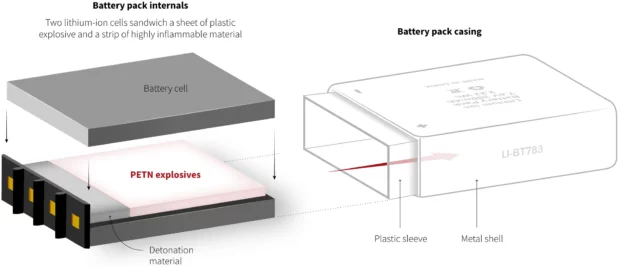No one in the West has commented on these exploding pagers.
However, it is probably obvious to everyone what this means: any electronic device owned by the enemies of the Jews could explode if it has gone through Western supply chains.
Just buy Chinese stuff, bro. I’m typing right now on a Chinese laptop, content in the knowledge it’s not going to blow my fingers off.
The batteries inside the weaponised pagers that arrived in Lebanon at the start of the year, part of an Israeli plot to decimate Hezbollah, had powerfully deceptive features and an Achilles’ heel.
The agents who built the pagers designed a battery that concealed a small but potent charge of plastic explosive and a novel detonator that was invisible to X-ray, according to a Lebanese source with first-hand knowledge of the pagers, and teardown photos of the battery pack seen by Reuters.
To overcome the weakness – the absence of a plausible backstory for the bulky new product – they created fake online stores, pages and posts that could deceive Hezbollah due diligence, a Reuters review of web archives shows.
The stealthy design of the pager bomb and the battery’s carefully constructed cover story, both described here for the first time, shed light on the execution of a years-long operation which has struck unprecedented blows against Israel’s Iran-backed Lebanese foe and pushed the Middle East closer to a regional war.
A thin, square sheet with six grams of white pentaerythritol tetranitrate (PETN) plastic explosive was squeezed between two rectangular battery cells, according to the Lebanese source and photos.
The remaining space between the battery cells could not be seen in the photos but was occupied by a strip of highly flammable material that acted as the detonator, the source said.
This three-layer sandwich was inserted in a black plastic sleeve, and encapsulated in a metal casing roughly the size of a match box, the photos showed.
The assembly was unusual because it did not rely on a standard miniaturised detonator, typically a metallic cylinder, the source and two bomb experts said. All three spoke on conditions of anonymity.
Without any metal components, the material used to trigger detonation had an edge: like the plastic explosives, it was not detected by X-ray.
This article reads like a Jew bragging about how clever he is.
Upon receiving the pagers in February, Hezbollah looked for the presence of explosives, two people familiar with the matter said, putting them through airport security scanners to see if they triggered alarms. Nothing suspicious was reported.
The devices were likely set up to generate a spark within the battery pack, enough to light the detonating material, and trigger the sheet of PETN to explode, said the two bomb experts, to whom Reuters showed the pager-bomb design.
…
From the outside, the pager’s power source looked like a standard lithium-ion battery pack used in thousands of consumer electronics goods.
And yet, the battery, labelled LI-BT783, had a problem: Like the pager, it did not exist on the market.
So Israel’s agents created a backstory from scratch.
Hezbollah has serious procurement procedures to check what they buy, a former Israeli intelligence officer, who was not involved in the pager operation, told Reuters.
“You want to make sure that if they look, they find something,” the former spy said, requesting not to be named. “Not finding anything is not good.”
Creating backstories, or “legends”, for undercover agents has long been a core skill of spy agencies. What made the pager plot unusual is that those skills appear to have been applied to ubiquitous consumer electronics products.
For the pagers, the agents deceived Hezbollah by selling the custom-created model, AR-924, under an existing, renowned Taiwanese brand, Gold Apollo.
Gold Apollo’s chairman, Hsu Ching-kuang, told reporters a day after the pager attack that he was approached about three years ago by a former employee, Teresa Wu, and her “big boss, called Tom” to discuss a licence agreement.
Hsu said he had scant information about Wu’s superior, but he granted them the right to design their own products and market them under the widely distributed Gold Apollo brand. Reuters could not establish the identity of the manager, nor whether the person or Wu knowingly worked with Israeli intelligence.
The chairman said he was not impressed by the AR-924 when he saw it, but still added photos and a description of the product to his company’s website, helping give it both visibility and credibility. There was no way to directly buy the AR-924 from his website.
Hsu said he knew nothing about the pagers’ lethal capabilities or the broader operation to attack Hezbollah. He described his company as a victim of the plot.
Taiwan should become an international pariah state for this.
Globally, people should be demanding that the country immediately expedite reunification with China.
It is simply not feasible to have electronic devices lined with explosives being shipped all over the world.
Apollo Systems HK YouTube account on December 13, 2022. posted the promo video for the Hezbollah pagers the AR-924. The license was purchased from Apollo to create these batteries.🦌
Taken down, but you can find them on the archives still (unless that gets taken down too). One… pic.twitter.com/qYqOKrwzc6
— Naturalized Deer 🇮🇱 (@PingouinHeureux) October 16, 2024
Elvis Dunderhoff contributed to this article.


